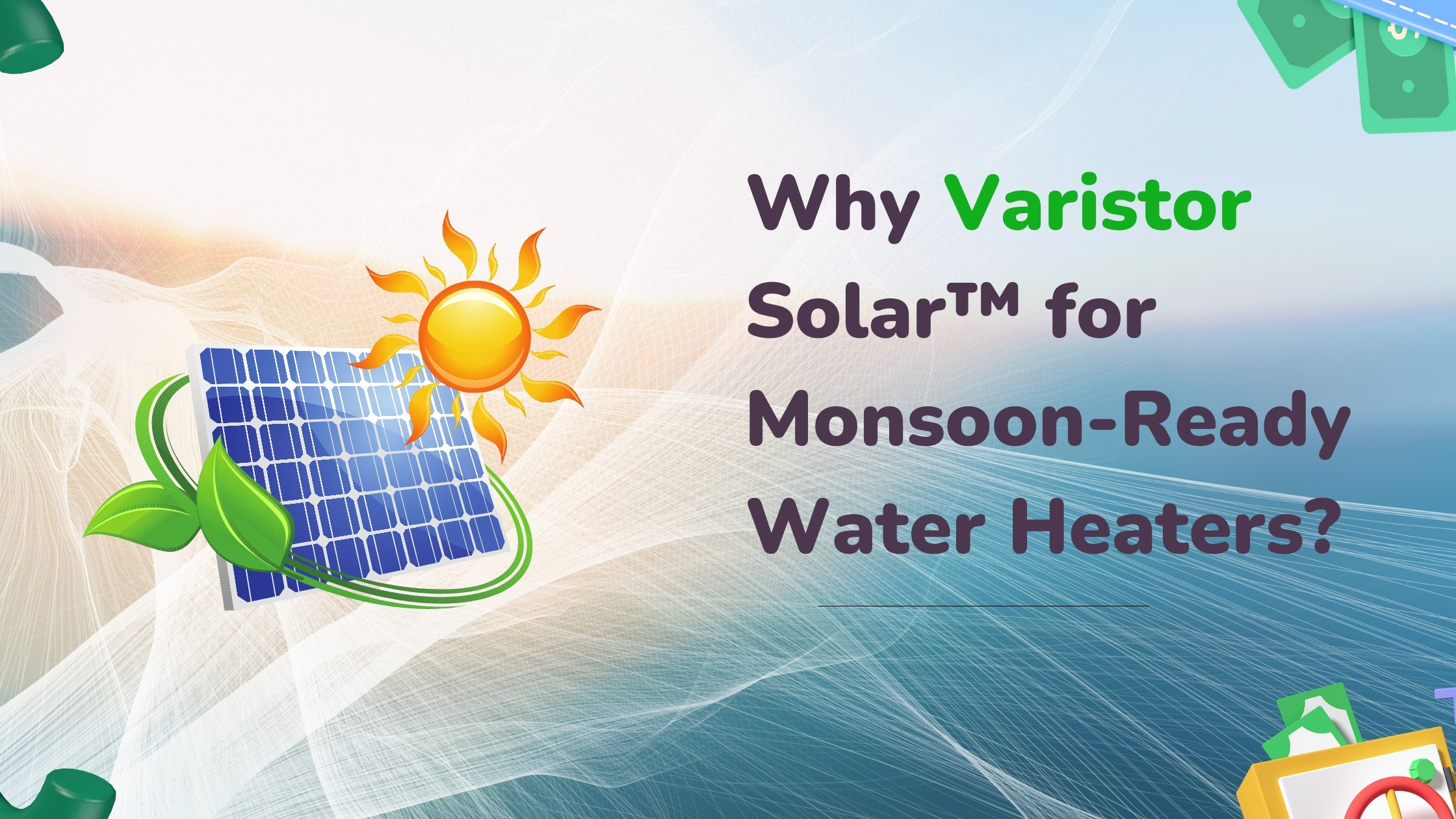
Varistor Solar is dedicated to empowering individuals, businesses, and communities with the transformative power of solar energy. We believe in a brighter, cleaner future and are committed to making sustainable living accessible to everyone.
+91-9113690456
Email: sales@varistorsolar.com
Varistor Solar
NO 40/C, KALKERE VILLAGE,12TH MAIN, NRI LAYOUT,Ramamurthy Nagar, Bangalore North,Bangalore- Karnataka, 560016
Introduction
As the monsoon clouds gather, bringing relief to the parched land, it's time to explore how we can make the most of this season's bounty. One of the often-overlooked advantages of the monsoon is the ample sunlight that can be harnessed to meet our daily needs. In this blog, we'll delve into the world of solar water heaters and discover why they are not only relevant but also highly efficient during the monsoon season. So, let's ride the monsoon wave and explore the incredible benefits of using solar water heaters in India.
Understanding solar water heaters
Before we plunge into the monsoon-specific benefits, let's take a moment to understand what solar water heaters are and how they work. Solar water heaters are eco-friendly devices designed to utilize sunlight to heat water for domestic and industrial purposes. They consist of solar collectors and a system to transfer the heat to the water. These systems can be broadly categorized into two types: active and passive.
Active solar water heaters use pumps to circulate water or a heat-transfer fluid through the collector and into the storage tank. On the other hand, passive solar water heaters rely on gravity and natural circulation to move water through the system. The choice between active and passive systems depends on various factors, including climate, budget, and the specific requirements of the user.
Now, let's dive into the unique advantages of using solar water heaters during the monsoon season.
Monsoon Sun: A Blessing in Disguise
Contrary to popular belief, monsoon skies are not always gloomy and overcast. In many regions, the sun often peeks through the clouds, providing a substantial amount of sunlight. Solar water heaters are designed to capture this diffused sunlight, making them a viable and efficient option even during the rainy season.
The monsoon sun might not be as intense as during the summer, but it is more than sufficient to power solar water heaters. By tapping into this resource, we can reduce our dependence on conventional energy sources and contribute to a greener, more sustainable future.
Rainwater and Solar Synergy
One of the most significant advantages of using solar water heaters during the monsoon is the synergy with rainwater harvesting systems. As the heavens open up and rainwater is collected, it can be used to complement the solar water heating process. The cool rainwater entering the system requires less energy to be heated, enhancing the overall efficiency of the solar water heater.
This synergy aligns perfectly with sustainable living practices, creating a harmonious cycle of using natural resources efficiently. By harnessing both solar power and rainwater, we can take a step closer to achieving self-sufficiency in our water heating needs.
Energy Savings Even on Cloudy Days
Monsoon days are notorious for their cloud cover, but that doesn't mean solar water heaters have become obsolete. Modern solar water heater technologies are equipped to capture and convert sunlight into energy, even on cloudy days. These systems utilize advanced collectors that can absorb diffused sunlight, ensuring a steady supply of heated water regardless of the weather conditions.
Investing in the Best Solar Water Heater in India
To truly harness the potential of solar water heaters during the monsoon, it's essential to choose the right system. In India, where the market is flooded with options, selecting the best solar water heater is crucial. Consider factors such as collector efficiency, storage capacity, and the type of system that aligns with your specific needs.
The best solar water heaters in India come with robust designs, energy-efficient features, and reliable performance. Conduct thorough research, read customer reviews, and consult with experts to make an informed decision. Remember, a well-chosen solar water heater is an investment that pays off not only in terms of energy savings but also in contributing to a sustainable future.
Maintaining Solar Water Heaters During the Monsoon
While solar water heaters are designed to withstand various weather conditions, a little maintenance can go a long way in ensuring their optimal performance during the monsoon. Here are some tips to keep your solar water heater in top-notch condition:
Regular Cleaning:
The monsoon brings with it dust and debris carried by the wind. Regularly clean the solar collectors to ensure maximum sunlight absorption.
Check for leaks:
Heavy rainfall can sometimes lead to leaks in the system. Inspect your solar water heater for any signs of water leakage and address them promptly.
Trim Surrounding Trees:
If you have trees near the solar collectors, trim the branches to prevent them from obstructing sunlight.
Inspect Insulation:
Ensure that the insulation around pipes and tanks is intact. This helps retain the heat generated by the solar collectors.
Professional Check-up:
Schedule a professional check-up at the beginning of the monsoon season to address any potential issues before they escalate.
Conclusion
As we embrace the monsoon season, let's not forget the untapped potential it brings for sustainable living. Solar water heaters, with their ability to harness the power of the sun even during cloudy days, are a beacon of hope for those seeking eco-friendly alternatives. By investing in the best solar water heater in India and incorporating it into our daily lives, we not only save on energy costs but also contribute to a cleaner and greener planet.
The monsoon is not a hindrance but an opportunity to leverage the abundance of sunlight and rainwater. As we journey towards a more sustainable future, let solar water heaters be our companions, turning rainy days into a source of warmth and energy. It's time to ride the monsoon wave and embrace the magic of solar water heaters for a brighter and cleaner tomorrow.
Final Say:
And remember, if you are thinking to buy a solar water heater, Varistor Solar™ will be the right choice for you. Don't hesitate to call us at 9113690456 or email us at sales@varistorsolar.com. Let's embark on this green journey together and make a positive impact on the environment and our lives.
"WHAT YOU CAN READ NEXT"
 Read more +03 September 2024 in Solar Water Heater
Read more +03 September 2024 in Solar Water HeaterWhich is the Best Solar Heater Brand in Yeshwanthpura, Bengaluru
 Read more +03 September 2024 in Solar Water Heater
Read more +03 September 2024 in Solar Water HeaterWhich is the Best Solar Heater Brand in Yelchenahalli, Bengaluru
 Read more +03 September 2024 in Solar Water Heater
Read more +03 September 2024 in Solar Water Heater





